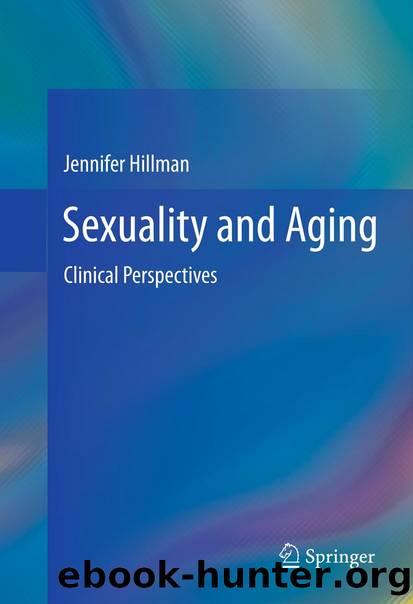Sexuality and Aging by Jennifer Hillman

Author:Jennifer Hillman
Language: eng
Format: epub
Publisher: Springer New York, New York, NY
Secondary Prevention
Studies of self-reports by older PLWA indicate that they continue to engage in sexual activity with relatively high frequency (Illa et al. 2008). Many lay people do not realize that safe sex practices are recommended for HIV-positive individuals, even when both partners are HIV positive, in order to help prevent them from reinfecting each other and to avoid passing different strains of HIV to each another. Unfortunately, estimates suggest that significantly more than one-third of older PLWA engage in unprotected vaginal and anal sex, with gay men having lower rates of condom use than both heterosexual men and lesbian and heterosexual women (Golub et al. 2010). The use of drugs and alcohol before sex, as well as limited knowledge of HIV/AIDS, is also associated with unprotected sex and other high-risk activities (Cooperman et al. 2007; Lovejoy et al. 2008). Greater fear of stigma is also associated with a decreased likelihood of even sharing their HIV-positive status with current or potential sex partners.
In the first study of its kind, Golub and colleagues (2011) sought to discover what individual factors were associated with older HIV-infected adults’ proactive use of condoms during sexual activity—and focus upon risk reduction. This group of researchers discovered that various aspects of psychological well-being, including one’s sense of personal growth and potential, of having quality relationships with others, and of having control over one’s life, were positively associated with condom use during sexual activity. Even when the older HIV-positive participants reported using substances, the potentially negative effect of drugs and alcohol upon condom use appeared to be overridden when psychological well-being was high.
Golub et al.’s (2011) study is important because their findings highlight the value of personal psychological resources among older HIV-infected individuals, and it suggests that therapeutic and social support interventions may serve as preventive health measures. Empirical studies have demonstrated consistently that both group therapy and interpersonally based support groups are very effective in reducing depressive symptoms among older PLWHA (Heckman et al. 2011), as well as increasing condom use when combined with condom negotiation skills (Illa et al. 2010). Because such studies suggest that group interventions are just as effective as individual interventions for older HIV-positive individuals, organizations and communities with limited resources can feel more confident about providing more typically cost-effective group interventions. Consistent with the value of social support for reducing feelings of social isolation and symptoms of depression, the contact information for various organizations available to assist both adults over 50 and their practitioners in coping with HIV/AIDS are provided in the appendix at the end of the chapter.
Download
This site does not store any files on its server. We only index and link to content provided by other sites. Please contact the content providers to delete copyright contents if any and email us, we'll remove relevant links or contents immediately.
Rewire Your Anxious Brain by Catherine M. Pittman(17599)
Talking to Strangers by Malcolm Gladwell(11905)
The Art of Thinking Clearly by Rolf Dobelli(8862)
Mindhunter: Inside the FBI's Elite Serial Crime Unit by John E. Douglas & Mark Olshaker(7848)
Becoming Supernatural by Dr. Joe Dispenza(7116)
Change Your Questions, Change Your Life by Marilee Adams(6654)
The Road Less Traveled by M. Scott Peck(6646)
Nudge - Improving Decisions about Health, Wealth, and Happiness by Thaler Sunstein(6642)
The Lost Art of Listening by Michael P. Nichols(6481)
Enlightenment Now: The Case for Reason, Science, Humanism, and Progress by Steven Pinker(6414)
Win Bigly by Scott Adams(6327)
Mastermind: How to Think Like Sherlock Holmes by Maria Konnikova(6250)
The Way of Zen by Alan W. Watts(5809)
Daring Greatly by Brene Brown(5649)
Grit by Angela Duckworth(4746)
Big Magic: Creative Living Beyond Fear by Elizabeth Gilbert(4734)
Men In Love by Nancy Friday(4339)
Flow by Mihaly Csikszentmihalyi(4060)
The Four Tendencies by Gretchen Rubin(4028)
